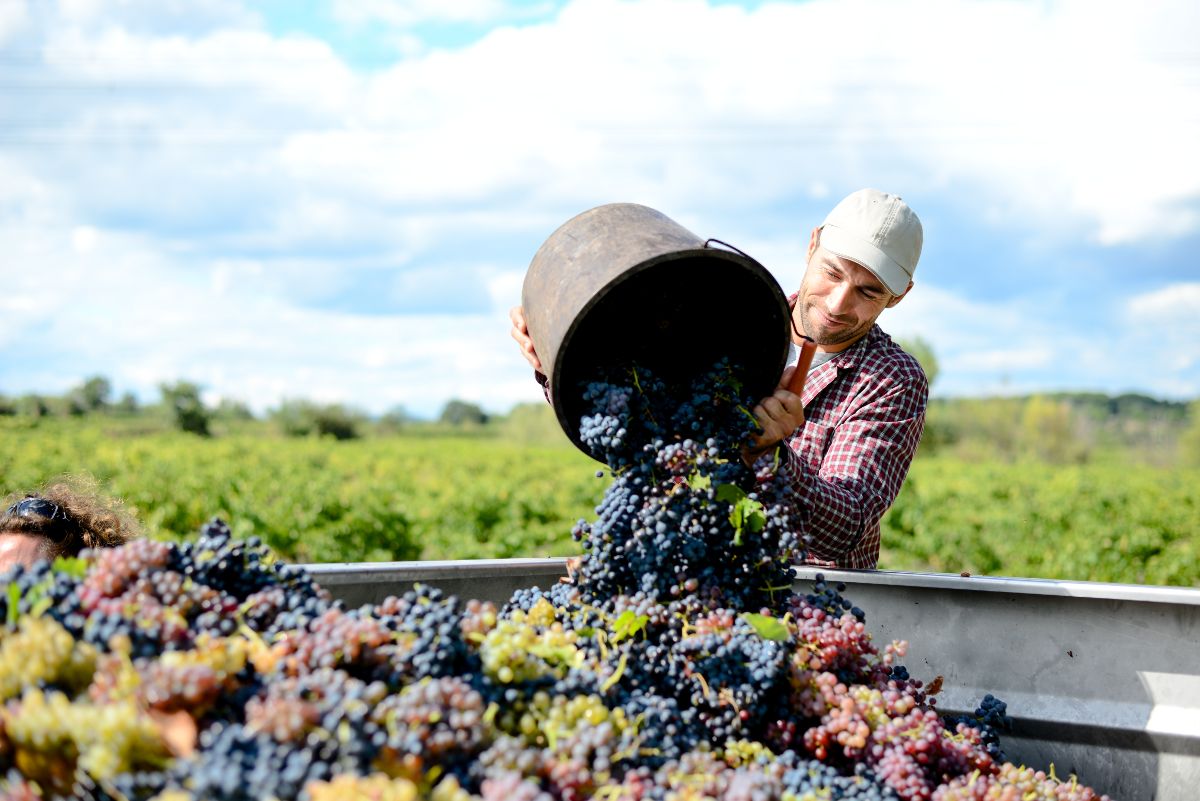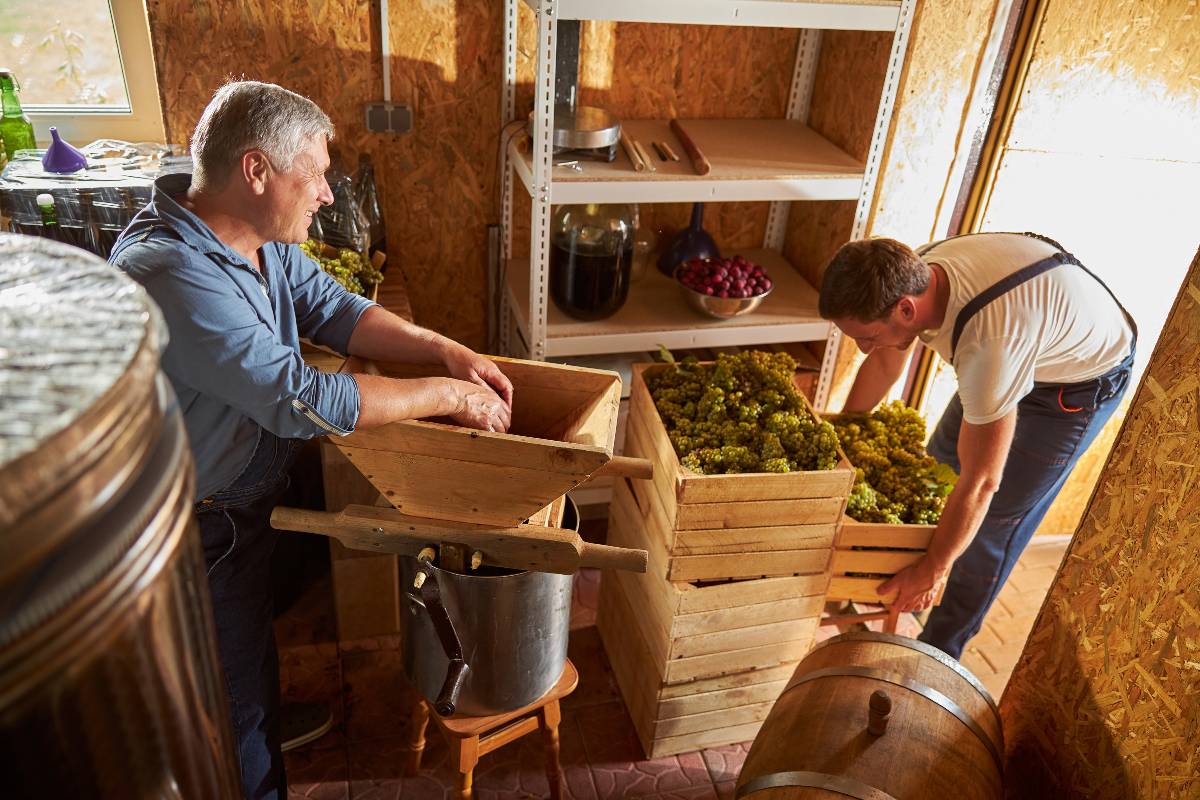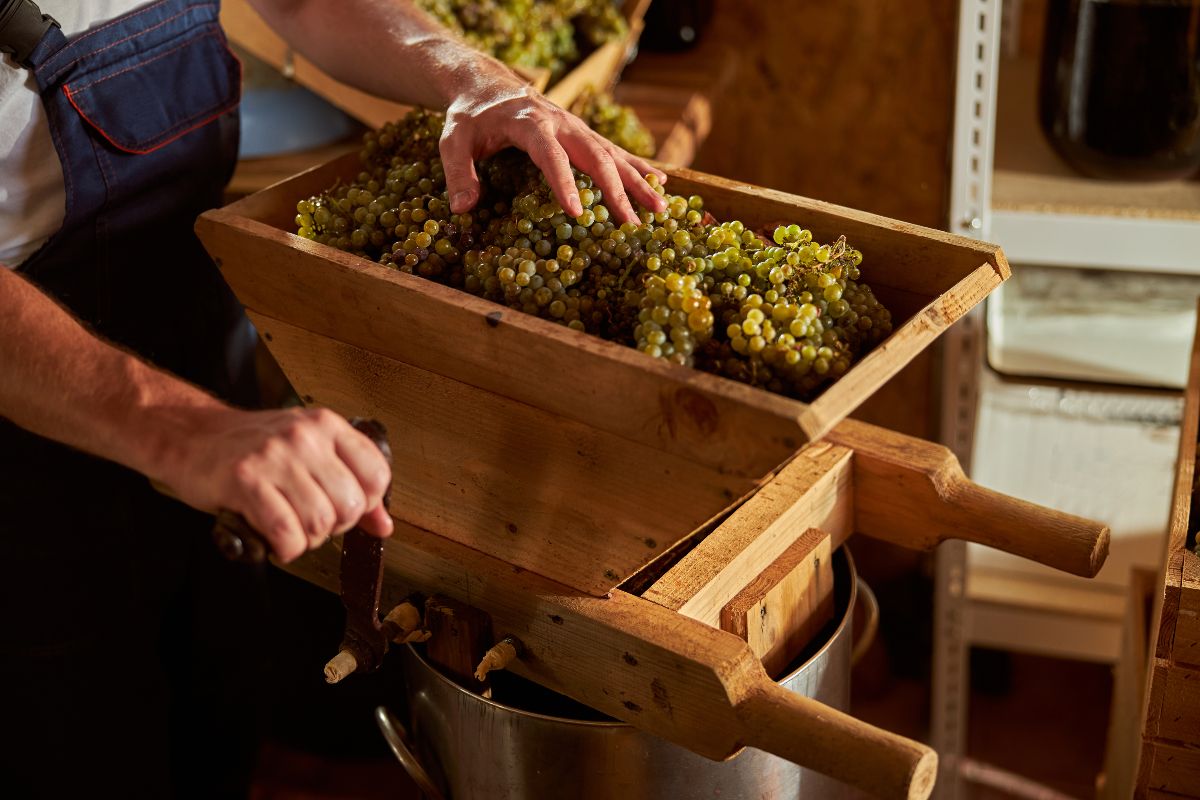Launching a winery intertwines the romance of winemaking with the thrill of entrepreneurship. Whether your passion lies in cultivating vineyards, running a wine shop, or innovating with a private label, this guide offers you the map to navigate the terrain of how to start a winery. This is your moment to transform your vision into a label that speaks directly to the hearts of wine lovers everywhere.
Whether you’re dreaming of tending vines under the sun or tapping into the digital marketplace, the wine world is ripe for exploration. Here are five ways you can enter the winery industry:
If you have a passion for viticulture, starting your own vineyard can be as challenging as it can be rewarding. This venture calls for an intimate connection with the land and a commitment to the craft of viticulture. It also requires a blend of agricultural knowledge – understanding the science behind soil types, grape varieties, and the intricate process of turning grapes into wine.

The benefits of establishing your own vineyard extend beyond the tangible. They encompass the pride of nurturing your land to produce wines that capture the essence of their terroir, potentially leading to high demand for your unique vintages and a strong, personal brand in the wine community.
The initial outlay can be daunting, with costs potentially stretching from $500,000 to well over $1 million, reflecting the price of land, planting, equipment, and the years of cultivation needed before your first harvest, which may be after three to five years. Other risks include vulnerability to weather, diseases, and market fluctuations, which can all impact yield and quality.
Stepping into the world of wine retail is an invitation to be part of a story much larger than the sum of its bottles. This venture taps into the rich tapestry of wine culture, offering a space for connection, education, and the joy of discovery.
Opening a wine shop has much lower initial setup costs, typically ranging from $50,000 to $100,000, and can be pretty profitable if you identify your target market and market yourself cleverly using social media and other channels. You have the chance to introduce your clientele to the world’s vineyards, guiding them through tastes and terroirs. Some challenges include navigating the competitive retail landscape and cultivating relationships with distributors.
A private-label wine business involves partnering with existing vineyards or wine producers to create and market wine under your own brand name. With a starting investment of $20,000 to $30,000, this venture allows you to collaborate with established vineyards to infuse each bottle with a narrative uniquely your own. This approach can significantly reduce time to market and operational complexities, allowing you to focus on building brand recognition and customer loyalty.
However, dependence on third-party producers for wine quality and inventory can pose risks, including supply shortages and regulatory compliance. Moreover, establishing a strong market presence demands effective marketing and brand differentiation strategies to ensure your wines stand out on shelves.
Purchasing a winery is a direct route to immersing yourself in the wine industry, offering immediate access to vineyards, production facilities, and an established brand. This option typically requires a significant investment, with prices varying based on location, vineyard quality, and the winery’s reputation, often stretching into the millions.
The appeal of this approach lies in the ability to capitalize on an existing infrastructure and market presence. It allows expanding upon the legacy of a winery and selling under an established brand. However, integrating into an existing winery requires a deep understanding of its operations, market position, and the intricacies of winery management. The initial purchase can also come with hidden costs related to updating equipment and marketing for brand repositioning.
Launching an online wine business represents a modern entry point into the wine industry, characterized by lower setup costs and the potential for a wide reach. With an investment that can start as low as $5,000, entrepreneurs can establish a digital storefront to market and sell wines directly to consumers worldwide.
This model allows you to ship wines anywhere in the world with the flexibility of inventory management and reduced overhead compared to physical stores. You also don’t have to produce the wines, as you can collaborate with wineries and distributors, purchasing wines at wholesale prices to resell wine online. However, setting up a strong online presence requires allocating heavy resources to digital marketing. The challenges also include adhering to the complex web of regulations governing the sale and shipment of alcohol across state and international borders.
Diving into the wine business opens a world where tradition meets innovation, and every bottle tells a story. Whether you aim to cultivate a lush vineyard or launch an online wine hub, success starts with a solid plan. Check out these 14 steps of how to start a winery below:
Effective marketing hinges on a profound understanding of your target audience. Start with actionable market research: distribute surveys, engage in social media listening, and analyze industry reports.
 Focus on gathering data about:
Focus on gathering data about:
This information will help you better craft targeted strategies, ensuring your wine appeals directly to those most likely to appreciate it.
The cornerstone of opening a successful winery is the grape. You can either grow your grapes or outsource them from farmers. Buying grapes is easier, but if you decide to plant your grapes, start by determining how many vines you want. A healthy vine makes about five pounds of grapes every season. On average, you need around 18 pounds of grapes to produce a gallon of wine (equal to five bottles).
Grapes used in winemaking are divided into three categories.
Thousands of grapes are used in winemaking worldwide. So, narrow it down to the specific type of grape you need to make your quality wine. Finding the type of grapes and wine you want to make will also determine the soil and location of your vineyard.
Winemaking grapes are fragile and grow well only in particular climates and soils. Grapes demand specific climates and soils to thrive – warm environments are typically favored, as seen in renowned wine regions like Napa Valley and Bordeaux. Yet, the diversity within wine grapes means that not all require the same conditions.
 For example, Cabernet Sauvignon thrives in sandy soil, while Merlot grows in clay soil. On the other hand, Pinot Noir loves loam soil, whereas Pinot Noir and Sauvignon Blanc thrive in limestone soil.
For example, Cabernet Sauvignon thrives in sandy soil, while Merlot grows in clay soil. On the other hand, Pinot Noir loves loam soil, whereas Pinot Noir and Sauvignon Blanc thrive in limestone soil.
Also, after deciding the types of grapes and how many vines you want to grow, consider the size of your land. If you’re leaning towards a particular location, ensure that it supports the grape varieties you want to grow. This might limit your options, but focusing on the compatibility between land and vine will be beneficial in producing exceptional wines.
For those eyeing the retail side with a wine shop, location plays a different yet equally significant role. Your shop’s site should be in an area with high foot traffic, accessibility, and a demographic aligned with your target market. For vineyards, matching grape varieties to their ideal terroir can be a benefit, while wine shops benefit from tourist areas like Napa Valley.
Choosing your bottle design is a strategic decision that communicates your brand’s story and appeals to your target market. Consider the shape, color, and size of the bottle, as each element plays a role in consumer perception. Traditional shapes like Bordeaux or Burgundy evoke a sense of classic wine heritage, while innovative designs can capture attention and signify a modern approach.
The color of the design also matters. For instance, darker glass offers better protection against light, preserving the wine’s quality. Beyond the bottle itself, pay attention to the label design and closure type. The label should be legible, inviting, and informative, while corks vs. screw caps each have implications for perceived quality and convenience.
After choosing your grapes, location, and bottle design, consider your wine company’s name and legal structure. Choose a catchy and creative winery name that stands out and represents you. Then, check if that name is available. Also, make sure the name is available for use online and on social media platforms.
After deciding the name of your winery business, you need to choose the type of business entity to register as. There are plenty of entities to choose from. Most wine companies run as a sole proprietorship, corporation, or Limited Liability Company (LLC). Registering as an LLC offers protection to the business owner and individual income tax rates.
 If you choose a sole proprietorship, you will be responsible for all company liabilities. The individual income tax rates can be beneficial as a sole proprietor. However, the business owner is liable for the company and risks losing their assets.
If you choose a sole proprietorship, you will be responsible for all company liabilities. The individual income tax rates can be beneficial as a sole proprietor. However, the business owner is liable for the company and risks losing their assets.
If you operate your business as a corporation, you will have limited liability and not be held solely responsible for the company’s debts. However, you will pay federal corporate income taxes levied at a 21% rate and state corporate taxes that range between 0% and 11.5%.
For any startup to succeed, it needs to have a practical business plan with a solid foundation. The business plan must include extensive research about the wine industry and your short and long-term goals.
The primary purpose of writing a business plan is to guide you in the winemaking journey. The winery business plan should include the following information:
Your business plan should be updated as your company grows. Consider every factor that may influence your business’s growth and tackle them in your plan. When you present your winery business plan to the bank or a potential private investor, you may significantly increase your chances of receiving financing.
Businesses that deal with alcohol require a vast amount of licensing and paperwork. First, you need to be licensed at the federal, state, and local levels. Then, you need to register your business with the Bureau of Alcohol, Tobacco, Firearms, and Explosives (ATF) and complete all required licensure. Once the previous steps are completed, you will need to obtain permits and licenses from the Alcohol and Tobacco Tax and Trade Bureau (TTB).
Licensing requirements vary depending on the state you will operate. Additionally, you may need further licensing if you plan to sell wine at your vineyard. Authorities will inspect your facility to ensure that standards are met and maintained, including safety and health regulations.
The wine industry has some strict regulations and requires different types of licensing and permits to operate. Below is the list of some of the paperwork you may need to complete before opening your wine business:
To avoid issues such as copyright violation and trademark counterfeiting, you should consider applying for intellectual property protection. This ensures your carefully cultivated brand identity and innovations in wine production are safeguarded against imitation or unauthorized use. By securing trademarks, you can solidify your market presence and defend your business against competitive infringements. To begin the process, complete the application form from the United States Patent and Trademark Office (USPTO) and have your trademark reviewed by lawyers.
Inventors, designers, developers, and authors can protect the ideas they have developed using copyrights or patents. The aim is to prevent others from wrongly profiting from their creations or inventions.
Most aspiring vintners don’t have $1.5 million to open a winery. But your dream isn’t out of reach if you don’t have the funds upfront. Many aspiring business owners turn to startup business loans to get their ventures off the ground.
There are different types of loans that you can apply for, such as bank loans, equipment loans, business lines of credit, and business credit cards. Here is how you can finance your vineyard or winery business:
Bank loans offer a traditional route with the potential for more favorable terms due to their local focus. These loans are best suited for substantial, upfront investments in your winery’s foundational aspects, like property and initial vine planting, as well as the startup costs of opening a winery or launching a private label.
The main benefit lies in the possibility of comprehensive funding, covering extensive startup costs from purchasing land to equipment. For good credit applicants, bank loans can offer higher loan amounts, longer terms, and lower interest rates.
However, the challenge comes with the industry’s perceived risk, often resulting in higher down payments and interest rates, averaging 6% to 7%. The rigorous application process and potential for collateral requirements pose challenges, especially for newcomers without established business credit. Loan amounts can range from $100,000 to over $1 million, with terms that can extend up to 10 to 15 years.
Equipment financing is more targeted, helping business owners purchase or lease equipment like fermenters and barrels for winemaking, shelving, and point-of-sale systems for retail. The terms of equipment loans can vary widely, but they typically offer amounts ranging from a few thousand to several million dollars, depending on the borrower's needs and creditworthiness. Loan terms can extend up to 10 years, with interest rates generally falling between 6% and 20%.
Importantly, the equipment being financed often serves as collateral for the loan, which can lower the risk for the lender and potentially result in more favorable loan terms for the borrower. But this means that if the borrower defaults on the loan, the lender has the right to seize the equipment to recover the loan amount.
Funds from equipment loans can be utilized for a variety of purposes directly related to starting and operating a wine business. This includes purchasing new or used winemaking equipment, upgrading existing machinery, leasing additional equipment to increase production capacity, or even acquiring vehicles for transporting wine.
A business line of credit is a flexible financing option that gives wine business owners access to a predetermined amount of funds, which can be drawn upon as needed. Unlike a traditional loan, which provides a lump sum of money upfront, a line of credit allows business owners to borrow only what they need, when they need it, up to the credit limit. Interest is only paid on the amount borrowed, making it a cost-effective way to manage cash flow for seasonal inventory purchases, unexpected expenses, or capitalizing on timely business opportunities.
The amounts available through a business line of credit can range widely, from as little as $10,000 to over $1 million, with repayment terms varying from six months to five years. Interest rates are typically competitive, ranging from 4% to 20%, based on the borrower's creditworthiness and the lender's terms.
This financial solution offers wine business entrepreneurs the adaptability to address a variety of financial needs, such as buying grapes or other raw materials, covering operational costs during off-peak seasons, or investing in marketing campaigns to launch a new product line. Given the wine industry's unique challenges, such as fluctuating demand, harvest seasons, and production timelines, a line of credit provides a safety net that can help smooth out cash flow irregularities.
Lastly, business credit cards provide immediate access to funds for day-to-day expenses and unexpected costs, acting as a revolving line of credit. This means business owners can make purchases up to a certain limit and pay the balance off over time, with interest applied to any carried balance. Unlike traditional loans or lines of credit, business credit cards are easy to apply for, often requiring less stringent credit checks and financial documentation.
Interest rates and terms for business credit cards can vary significantly, with APRs typically ranging from 13% to 24%. However, many cards offer introductory periods with 0% APR, allowing business owners to make large purchases and pay off the balance without accruing interest for a set period, usually 12 to 18 months.
Furthermore, business credit cards come with a range of rewards and benefits tailored to businesses, such as cash back on purchases, travel rewards, and discounts with partner companies. These rewards can be particularly beneficial for wine businesses, where expenses on travel, dining, and supplies are common, allowing owners to reinvest savings back into their ventures.
Having the proper insurance for your business is necessary to protect it from damage or losses. It is best to hire a qualified insurance broker to evaluate your business and suggest the right insurance policy. Insurance can cost upwards of $5,000 per year.
Winery businesses usually obtain the following insurance policies:
It is no surprise that you need winery equipment to turn your grapes into wine.
 Commercial winemaking equipment can be costly; therefore, before buying equipment, consider the following:
Commercial winemaking equipment can be costly; therefore, before buying equipment, consider the following:
Once you have those figured out, you can purchase the necessary winery equipment suitable for your needs. Equipment for operating a winery may include:
For retail and online wine shops, common equipment can include:
As a new wine business owner, you need to master some skills and techniques to run a successful business. Consider acquiring professional qualifications and enrolling in training courses related to the industry. This will help you gain more knowledge and be an expert in your field. There are many courses and certificates available for those who want to be viticulturists or enologists.
A viticulturist is a person who is responsible for choosing the type of grape and harvesting it. An enologist is a person who is responsible for making the one and supervising the process of fermentation. You can also get a certificate to become a sommelier and work in various aspects of the business, such as sales, marketing, and distribution.
A handful of courses offer certificates in enology and viticulture, such as the Washington State University and the Viticulture & Enology Science & Technology Alliance (VESTA). The duration of the programs varies from 18 months to two years.
Below is a list of reputable organizations that offer certificates in the field of wine and spirits:
In winemaking, your brand is more than just a logo or a label on a bottle – it’s a reflection of your vineyard’s or brand’s story and the unique character of your wines.
 Here are some tips to help enhance your winery’s visibility and appeal:
Here are some tips to help enhance your winery’s visibility and appeal:
The winery business requires investing serious capital. The most considerable cost would be your vineyard. Starting a vineyard in the U.S. costs between $35,000 and $45,000 per acre. But your expenses regarding the land don’t stop there. To keep your vines healthy, you may invest another $15,000 to $20,000 per acre within the first three years.
The second most expensive investment would be constructing the vineyard facility, wine-tasting rooms, and administrative buildings. This could cost around $200,000. Additionally, the electronic equipment and furniture for the offices could cost around $20,000.
Moreover, licensing, insurance, and permits can cost around $5,000. Effective marketing can start at $5,000 per month and grow much higher depending on your goals.
Other startup and operational costs to consider include hiring employees and applying for intellectual property rights.
The cost of equipment to produce wine can be upwards of $250,000. Ultimately, an estimated $1.5 million may be required within the first five years of starting a winery.
Here are some frequently asked questions to clarify your path ahead:
Yes, you can start a winery without owning a vineyard by sourcing grapes from other growers or focusing on the production and marketing side of the wine business. This approach can significantly reduce initial capital requirements and allow you to concentrate on wine-making and brand development.
A winery can be a good investment if approached with thorough market research, a solid wine business plan, and an understanding of the industry’s challenges and opportunities. While it requires significant upfront investment and patience, the winery business offers the potential for lucrative returns and personal fulfillment over time.
Starting a winery from scratch typically takes several years. From acquiring land and planting vines (three to five years) to obtaining the necessary licenses and establishing your brand in the market, expect at least five to seven years before seeing a return on investment.
Wine farming, or viticulture, is the cultivation of grapevines for winemaking. It involves selecting the right grape varieties, soil management, controlling pests and diseases, and managing the harvest to produce grapes that meet the winemaker’s specific requirements for wine production.
A micro-winery is a small-scale winery operation that typically produces a limited amount of wine, often using grapes sourced from outside vineyards. These operations focus on artisanal or craft wine production, with an emphasis on quality and uniqueness over volume, often selling directly to consumers through tasting rooms or local markets.
Launching into the wine industry, be it through a vineyard, a chic online shop, or a cozy wine retail space, blends passion with patience and precision. Success doesn’t happen overnight; it’s a journey marked by dedication and a well-charted business strategy.
Ensuring you’re armed with a solid plan, the right licenses, and a loan that matches your venture’s needs is key. While the road to profit may be long, the wine industry offers rich rewards for those prepared to invest their time and effort into cultivating or selling these bottled tales or terroir.